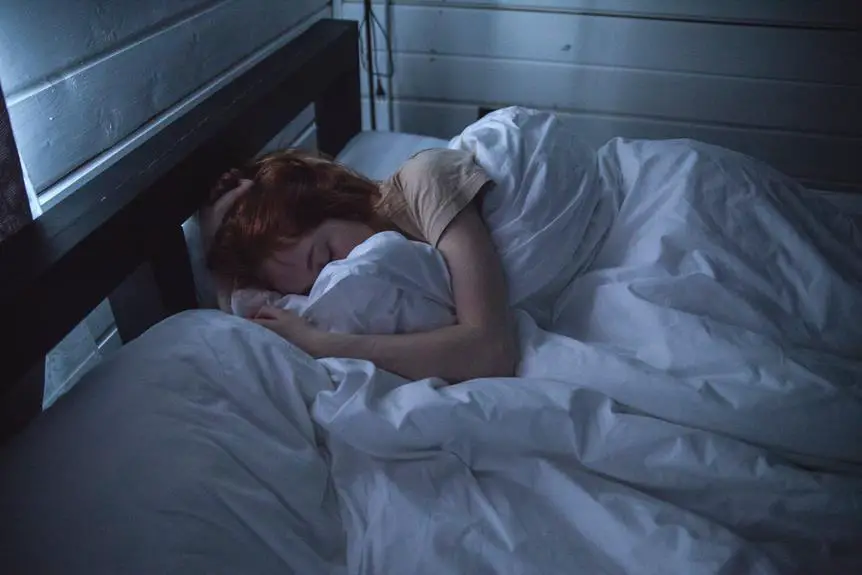Do you know why your bed sheets feel damp?
High humidity levels, mattress perspiration, inadequate ventilation, damp room conditions, and a water-resistant mattress protector could be the culprits.
Understanding these reasons can help you address the issue and ensure a comfortable night's sleep.
Key Takeaways
- High humidity levels impede evaporation of moisture from bed sheets, leading to a damp feeling.
- Moisture buildup in the mattress and bedding can create an environment for mold and mildew growth.
- Inadequate ventilation and air circulation exacerbate the issue of mattress perspiration and moisture buildup.
- Proper moisture control, including the use of breathable, moisture-wicking fabrics and a water-resistant mattress protector, can help prevent dampness in bed sheets.
High Humidity Levels
If you live in a region with consistently high humidity levels, your bed sheets may feel damp even if they were just recently changed. High humidity can impede the evaporation of moisture from your sheets, making them feel damp. This can be a breeding ground for mold and mildew, which can lead to health issues and damage to your bedding.
To prevent this, it's crucial to focus on air circulation. Ensure that your bedroom is well-ventilated and invest in a dehumidifier to regulate the moisture levels in the air. Additionally, using breathable, moisture-wicking fabrics for your bed sheets can help mitigate the effects of high humidity.
Regularly airing out your bedding and allowing sunlight into your bedroom can also aid in moisture reduction. By prioritizing air circulation and mold prevention, you can effectively combat the issue of damp bed sheets caused by high humidity levels, ensuring a comfortable and healthy sleep environment.
Mattress Perspiration
When your body perspires during the night, the moisture can seep into your mattress, contributing to the dampness you feel in your bed sheets. Mattress perspiration occurs when the sweat your body produces while sleeping is absorbed by the mattress. This can lead to a buildup of moisture over time, creating an environment conducive to the growth of mold and mildew. To mitigate this issue, it's important to invest in a mattress protector made of breathable fabrics that allow for better airflow and sweat absorption. Additionally, regularly airing out your mattress and using moisture-wicking bedding can help minimize the impact of perspiration on your mattress. Below is a table to illustrate how mattress perspiration affects your sleeping environment:
| Issue | Impact | Solution |
|---|---|---|
| Mattress Perspiration | Dampness and odor | Breathable mattress protector |
| Mold and Mildew Growth | Health risks and unpleasant smell | Moisture-wicking bedding |
| Discomfort | Poor sleep quality and potential allergies | Regularly airing out the mattress |
Inadequate Ventilation
Inadequate ventilation in your bedroom can exacerbate mattress perspiration, leading to a buildup of moisture that causes your bed sheets to feel damp. Proper air circulation is crucial for moisture control in your sleeping environment. When your bedroom lacks adequate ventilation, the air becomes stagnant, trapping moisture from perspiration, breathing, and other sources. This trapped moisture can then accumulate in your mattress and bedding, making them feel damp and uncomfortable.
To address inadequate ventilation, consider implementing some simple strategies to improve air circulation in your bedroom. Opening windows during the day, using fans, and investing in an air purifier with a built-in ventilation system can help promote airflow and reduce moisture buildup. Additionally, regularly airing out your bedding and mattress can aid in moisture control.
Damp Room Conditions
To address damp room conditions, ensure proper ventilation and moisture control in your sleeping environment to prevent your bed sheets from feeling damp. Mold prevention is crucial in maintaining a dry and healthy sleeping space. Use the table below to understand the benefits of using a dehumidifier to combat dampness.
| Dehumidifier Benefits | Description |
|---|---|
| Prevents Mold Growth | Reduces moisture in the air, preventing mold from thriving. |
| Improves Air Quality | Removes allergens and irritants, creating a healthier environment. |
| Protects Your Home | Preserves furniture, electronics, and clothing from moisture damage. |
| Enhances Comfort | Reduces musty odors and creates a more comfortable living space. |
| Saves Energy | Helps air conditioners and heaters work more efficiently. |
Water-Resistant Mattress Protector
Consider investing in a water-resistant mattress protector to further safeguard your sleeping environment against dampness.
- Spill Protection: A water-resistant mattress protector acts as a barrier against spills, preventing moisture from seeping into your mattress and causing dampness.
- Allergy Protection: Many water-resistant mattress protectors are designed to protect against allergens, such as dust mites and pet dander, offering a shield against potential allergens that can contribute to dampness and discomfort while sleeping.
- Breathable Fabric: Look for a mattress protector made from breathable materials to ensure adequate airflow and temperature regulation, preventing moisture buildup and maintaining a comfortable sleeping environment.
A water-resistant mattress protector not only guards against dampness but also helps in preventing bed bug infestation by creating an additional barrier.
Furthermore, it offers an added layer of protection against allergens, ultimately contributing to a healthier and more comfortable sleeping experience.
Frequently Asked Questions
Can Using a Dehumidifier Help Reduce the Dampness in My Bed Sheets?
Using a dehumidifier can help reduce dampness in bed sheets by lowering humidity levels. This benefits breathable materials, preventing moisture buildup. Pay attention to the type of sheets used as well, as some materials are more prone to retaining moisture.
Are There Specific Types of Bed Sheets That Are More Resistant to Feeling Damp in High Humidity Levels?
To resist dampness in high humidity, choose bed sheets with high threadcount and moisture-wicking properties. Consider materials like microfiber and bamboo fiber, which are known for their ability to repel moisture and keep you comfortable all night.
How Often Should I Replace My Mattress to Avoid Excessive Perspiration Affecting My Bed Sheets?
To avoid excessive perspiration affecting your bed sheets, consider replacing your mattress every 7-10 years, depending on its lifespan. Additionally, improving ventilation in your bedroom can help reduce moisture buildup and keep your bed sheets dry.
Are There Any Specific Techniques for Improving Ventilation in a Bedroom to Prevent Damp Bed Sheets?
To improve ventilation in your bedroom, consider adding a ceiling fan, opening windows, and using breathable fabrics for bedding. Incorporating bedroom decor that promotes airflow, such as open shelving and minimal furniture, can also help prevent damp bed sheets.
Can Using a Waterproof Mattress Protector Also Help With Preventing Dampness in Bed Sheets?
Yes, using a waterproof mattress protector can help prevent dampness in bed sheets by creating a barrier against spills and moisture. Additionally, choosing breathable bedding and moisture-wicking fabrics can further improve the situation. Proper ventilation tips also aid in reducing dampness.
- How to Draft a Glove Pattern for Nonwoven Fabrics - July 11, 2025
- How to Use Sterile Nonwoven Sponges for Medical Applications - July 11, 2025
- How to Make Nonwoven Polypropylene Non-Absorbent - July 11, 2025



